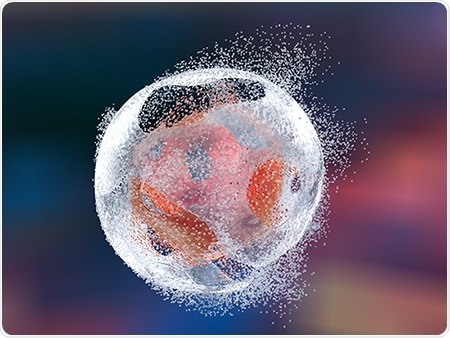Human cells are known to react to various stresses such as metabolic imbalance, DNA damage, and starvation by firstly attempting to fix the issue.

This discovery has implications in cancer, stem cell growth, and blood or neuron progenitor cell speciation. Image Credit: University of Alabama at Birmingham.
If that strategy fails, the cells subsequently promote programmed cell death, known as apoptosis. Apoptosis is an extremely regulated cell fate decision that eliminates approximately 50 billion to 70 billion cells every day in adults. Apoptosis’ regulators monitor the functions of cells, particularly the replication of cells and the decision to infiltrate into the cell cycle.
This part of a cell’s life needs precise replication of DNA and error-free separation of chromosomes. At numerous checkpoints during the course of this process, there are pathways to promote apoptosis as required.
Now, scientists William Placzek, Ph.D., and Robert Whitaker from the University of Alabama at Birmingham have discovered a direct relationship between a cell-cycle checkpoint protein known as P18 and the protein MCL1—a part of the huge BCL2 protein family called the gatekeepers of apoptosis.
Through this relationship, the scientists demonstrated for the first time that the MCL1 protein, which plays a role in the decision between programmed cell death or cell survival, can also directly trigger the proliferation of cells, through the CDK4/6-RB pathway.
The researchers’ results appeared in the journal Cell Death & Disease—the official journal of the Cell Death Differentiation Association.
Placzek is an assistant professor in the Department of Biochemistry and Molecular Genetics at the University of Alabama and also an associate scientist in the O’Neal Comprehensive Cancer Center at the University of Alabama. Whitaker is a graduate student in the Placzek’s laboratory.
The BCL2 protein family comprises anti-apoptotic proteins and pro-apoptotic proteins that compete through direct binding of proteins to establish the fate of cells. Such thorough interactions play an important role in human health because the anti-apoptotic BCL2 protein family is known to be the major regulator of cancer tumorigenesis and/or anti-cancer treatment responses.
Protein upregulation is a regular event in different types of cancer. Specifically, overexpression of MCL1—the anti-apoptotic BCL2 protein family—is a mechanism that is utilized by solid tumors to elude certain routine cancer chemotherapies.
Apart from its role in cancer, Placzek stated, “We expect this communication between the BCL2 family and the CDK4/6-RB pathway exists and will have a significant impact in normal cellular proliferation, in stem cell growth and in differentiation. Of particular interest is how this interaction impacts hematopoietic and neuronal progenitor cell speciation, where MCL1 has been identified as a key mediator of differentiation.”
Study details
Roughly nine years ago, Placzek and collaborators at the Sanford-Burnham Medical Research Institute identified a new kind of protein motif that could couple to the MCL1’s mouse version.
A protein structural motif can be described as a secondary structure on the protein that communicates with a secondary structure on another protein, similar to a space capsule that launches at the International Space Station. Discovered by Placzek and collaborators, this innovative motif was a reversal of the popular binding motif BH3, and hence the team named it reverse BH3 or rBH3.
Search for the human genomic DNA sequence led to the identification of a number of proteins that putatively contained an rBH3 motif, which also includes P18; P18 is a regulator that acts at the G1/S phase of the mammalian cell cycle. The latest work highlights the biological importance of the rBH3 motif.
We have demonstrated that the rBH3 motif is more than a unique peptide sequence. It is a natural protein motif that is able to mediate direct protein-to-protein interactions between MCL1 and an rBH3-containing protein.”
William Placzek, PhD, Researcher, University of Alabama at Birmingham
With the help of a wide range of biological chemistry tools like co-immunoprecipitation, pull-down experiments, protein overexpression, protein expression knockdown, small molecule inhibitors, and chimeric proteins, both scientists have described the mechanism of MCL1-P18 binding as well as its biological importance.
The researchers demonstrated that these proteins bind together both in vitro and endogenously within the cells of a pair of solid tumor cell lines; the duo also demonstrated that the rBH3 motif on P18 was essential and adequate to regulate that binding process.
In both solid tumor cell lines, the researchers demonstrated that when MCL1 is overexpressed, it leads to a loss of P18 via a transcriptionally independent cysteine-protease degradation mechanism. This overexpression of MCL1 also had an impact on the cell cycle, as demonstrated by a reduction in the G1 cell population and relative increases in the G2/M and S populations. Such changes are dependent on RB1.
The scientists finally demonstrated that these changes take place due to the increased proliferation of cells and not due to the alternate possibility, that is, a G2/M block.
Source:
Journal reference:
Whitaker, R. H. & Placzek, W. J., (2020) The MCL1 binding to the reverse BH3 motif of P18INK4C couples cell survival to cell proliferation. Cell Death & Disease. doi.org/10.1038/s41419-020-2351-1.